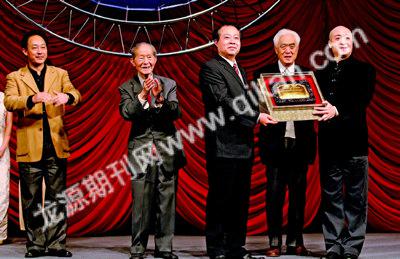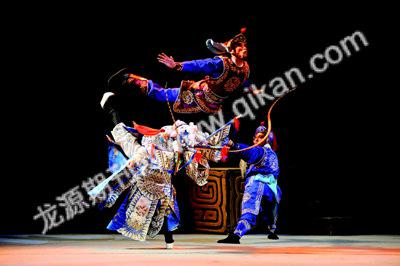A Play Refined over Ten Years
2009-06-08WuTingting
Wu Tingting

“Gongsun Zidu”, a Kunqu Opera play that won a top national stagecraft excellence prize last year, was a theatrical masterpiece created and refined over a period of ten years. After nine scripts and four names over the decade, the play from a traditional repertoire became a prize-winning tour de force for Zhejiang Kunqu Opera Troupe. It is regarded as another milestone since the “Fifteen Strings of Coins”, a sensational masterpiece that ushered in a renaissance of Kunqu Opera in the 1950s.
Kunqu Opera, an extremely refined stage art form that features lyrical poetry, singing and dancing, was on the verge of extinction in the middle 20th century. The government, the general public, and the Kunqu opera people have worked hard to inject new life into the ancient art. Since it was listed in May, 2001 by UNESCO as a “Masterpiece of the Oral and Intangible Heritage of Humanity”, the stage art has found it much easier to survive and prosper. Preferential and stimulating government policies and a national work committee are in place to make sure that the countrys seven Kunqu Opera troupes survive and flourish under a new suite of guidelines and financial support.
“Dongsun Zidu” originally comes from a short play called “Revenge on Zidu” based on a brief account in history. The storyline is pregnant with dramatic possibilities. According to history, Yin Kaoshu and Gongsun Zidu vied each other to be the commander in chief for a war between two small states. The ranker ran deep in the heart of Gongsun Zidu when he failed to make the commander in chief. He killed Yin Kaoshu the commander-in-chief with an arrow shot while the army was charging at the enemy phalanx. Gongsun Zidu won the war. At the victory banquet, however, the ghost of the dead general appeared and accused Gongsun Zidu of the assassination on the battleground.

Playwright Zhang Lee and director Shi Yukun discussed the scenario and decided to rewrite the storyline to transform it into Chinas Macbeth in Kunqu Opera. They wanted to explore the depth of human heart and mind instead of “punishing the bad and lauding the good”. In the new scenario entitled “The Crime of a Hero”, Gongsun Zidu, driven by jealousy and hunger for military honor, killed the commander-in-chief and took all the honors for the victory. He was later tortured by the fear of being found out. A big modification introduced into this version was that it was no longer a melodrama of martial arts. Gongsun Zidu was given a lot of opportunity to sing arias that revealed his agonized conscience and guilt.
The new version ignited heated discussions and brought about mixed reviews. However, all the critics and experts concerned agreed that there were possibilities for a better version. Forums were organized and discussions were held; comments and suggestions were aired and heard; ideas were solicited and exchanged. The prize-winning scenario got born.
The last major scenario got its present name. In this new script, Gongsun Zidu kills Yin Kaoshu out of jealousy and misunderstanding that Yin Kaoshu is trying to steal his military exploit. The truth is that Yin Kaoshu wants to be the commander-in-chief because he knows his sister is in love with Gongsun Zidu and he charges at the head of his army because he wants his would-be brother-in-law safe in the upcoming war. Gongsun Zidu finds the truth when he marries the younger sister of Yin Kaoshu. Unable to face his mistake and guilt, the hero kills himself. The latest version illustrates the tragedy in the theme: a momentary slip in morality could lead to disaster and it is easier to have an evil idea than have a good idea.
The latest adaptation is new in several aspects. It breaks away from conventional Kunqu Opera plays which usually dramatize romances between a scholar and a beauty. The play not only emphasizes martial arts, which is extremely rare in the genre, but also exposes the generals heart and soul in arias and monologues, which is also extremely rare in the genre. The introduction of a key woman into the play is another inspiration. It helps audiences have an insight into the heart and soul of the military hero. The northern style and southern style of Kunqu music are mixed in arias, modern lighting techniques are employed to highlight combat carriages and troupers, martial arts and soul-searching are harmonized. All this contributes to the brilliance of the play.
Contributions came from beyond Zhejiang Province. The different versions of the play were directed by several award-winning stage directors over its ten-year-long evolution; artists from Hong Kong and Changchun and other places gave their thoughtful advice and suggestions.
Adding to the glory in the “Fifteen Strings of Coins” and the “West Garden” over the past 50 years, “Gongsun Zidu” is the newest masterpiece by a new generation of Kunqu artists in Zhejiang Kunqu Opera Troupe.□
